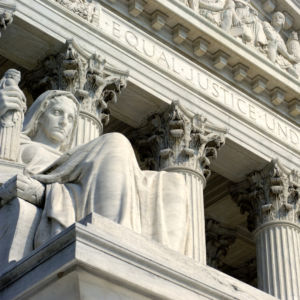The U.S. Supreme Court should outlaw forced union dues in the public-sector when it hears the Mark Janus case early next year, argued a legal brief submitted to the court Wednesday.
The Competitive Enterprise Institute (CEI) filed the amicus brief in support of Mark Janus who managed to take his fight against forced public-sector union dues to the highest court. Janus and two other Illinois state workers argue in their lawsuit that mandatory union dues violate their constitutional rights.
The U.S. Constitution bans compelled speech – including being forced to fund political activities. The lawsuit argues that public-sector union bargaining is political in nature because it deals with the allocation of taxpayer dollars and government resources.
The CEI brief details several instances in which unions have used compelled dues to engage in political advocacy – in an alleged violation of constitutional law. It specifically points to examples from unions like the American Federation of Teachers, the National Education Association, and the Service Employees International Union.
“For too long, the government has forced workers to pay for controversial political activities by unions that they do not support and that have nothing to do with union representation,” CEI labor policy expert Trey Kovacs said in a statement provided to InsideSources. “The Supreme Court should provide choice over whether to pay for labor union representation for millions of teachers, firefighters, and other public employees.”
The American Federation of State, County and Municipal Employees (AFSCME) is the primary union that the lawsuit targets – but the eventual aim is to end mandatory dues or fees for all public-sector workers by setting a legal precedent at the Supreme Court.
The legal brief details how the union featured a lengthy “AFSCME for Hillary” program during its convention last year – when the presidential election was still underway. The convention also called for gun control legislation and opposition to voter-identification laws. Democratic nominee Hillary Clinton even gave a speech during the convention.
Labor unions and their supporters claim that optional dues encourage workers to free-ride on the benefits they fight for. Workers might decide not to fund their union knowing that they will get the benefits anyway. But critics counter that it’s really about giving workers a choice instead of forcing them to fund an organization they might not support.
Labor unions cannot require anyone to be a member but they can require payments from employees once they organize a workplace. Nonmembers must be given the option to pay a nonpolitical fee instead of full dues. The 1977 case Abood v. Detroit Board of Education set the current standard, which the lawsuit hopes to overturn for public-sector workers.
The Supreme Court decided to accept the case Sept. 27 following a split decision for an identical case last year. The National Right to Work Legal Defense Foundation (NRTW) has been assisting in the lawsuit alongside the Liberty Justice Center (LJC).

